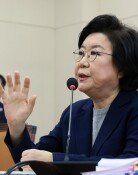Child abandonment increasing again
Child abandonment increasing again
Posted November. 20, 2000 13:21,
The abandonment of children, which peaked in 1997 soon after the economic crisis and was declining afterward, once again is rising. Many have pointed to the current economic downturn as the cause of such increase.
As these children could later become a source of greater instability of our society, a greater social concern should be given at this point.
Abandonment of children:
Nov. 18, 4 p.m., Sung Bang Foster Care Center in Pusan, a children's welfare institution: Two brothers, Lee Kyung-Bin, 4, and Lee Sung-Bin, 3, who had come to the care center four days earlier ran out toward the street calling out repeatedly, "Grandfather!" as they avoided the watchful eyes of the caretakers.
Finally consoled by the caretaker, "Your grandfather will come tomorrow," the two brothers stopped crying. The two boys were brought to the center by their grandfather, who himself was struggling day to day. The two boys had come under his care last month when the father left home after losing his job and the mother went missing soon afterward.
In Pusan, 21 foster care facilities currently have 1,512 children, which is a jump from last year.
At the temporary child-care facility in Yonjae-ku, Pusan, a sister, 10, and a brother, 6, came last month following the arrest of their single-parent mother, who was caught stealing to put food on the table. They have become virtually mute since coming and sadden the hearts of the caretakers.
At least their being together makes them luckier than others. In the case of siblings being separated, the double trauma takes its toll, requiring longer period of anguish and adjustment.
Toward the end of last month, a mother in her late 20s left a 2-year-old at a clothier, "Could you watch my son while I go to the ladies' room?" Since being brought to the care center, the 2-year-old has not stopped crying.
At a care facility in Kwangju, two brothers, ages 10 and 4, were brought by neighbors in May after their father failed in his business and their mother abandoned the family. The older brother refuses to go to school and does not get along with other children, requiring greater concern by the caretakers.
In the case of a larger facility in Kyongnam Province, the Dongbo Foster Care Center in Changwon, the number at the center increased by seven in the past three months to 75.
At another large facility in Masan, the Masan Foster Care Center, the number increased by six since early this year to 74. Another 25 smaller facilities within the city all have experienced increases in the numbers of children.
At the Dongbo Foster Care Center, three siblings, Min-Ju, 7, Min-Ho, 3, and Min-Shik, 2, were brought by their grandmother after their mother abandoned the family followed soon after by their father.
Problem and possible solution:
At the Ulsan Foster Care Center, the only facility in Ulsan, the number of dependent children increased 40% compared to 1997 and currently stands at 112. Twenty facilities in Taegu have 1,118. Eleven facilities in Taejon care for 540 children while 10 in Kangwon care for 570. With five facilities in Cheju accounting for 298, all areas and facilities have recorded a 10% increase since the beginning of the year.
"Most of these abandoned children find it hard to overcome the trauma and show signs such as loss of speech, autism and even people-avoidance syndrome," a caretaker said. "Once brought to the facilities, it is rare, not to mention even simple phone calls, for the parents to return and become reunited."
The director of the Sung-bang Foster Care Center Cho Kwang-Hyun said: "We can feel first-hand the effects of the economic downturn, as the number of the parents bringing their children or for consultation has increased greatly. Many of these children simply lack any home caretakers due to divorce or abandonment."
Professor of Child Welfare at Pusan University Moon Suh-Hwa said: "Abandoning children is an act of neglect and even abuse. As the welfare of children simply cannot be considered when the parents and children are separated, it is better for the family to stay together even if they live under the poverty line and find it hard even to eat."
Professor Moon further said that expanding the scope of the guaranteed living standard compensation to include a provision for child care would be a countermeasure to improve the welfare of children.
Cho Yong-Hui silent@donga.com




![하버드 의사가 실천하는 ‘뇌 노화 늦추는 6가지 습관’ [노화설계]](https://dimg.donga.com/c/138/175/90/1/wps/NEWS/IMAGE/2026/01/22/133210626.3.jpg)


